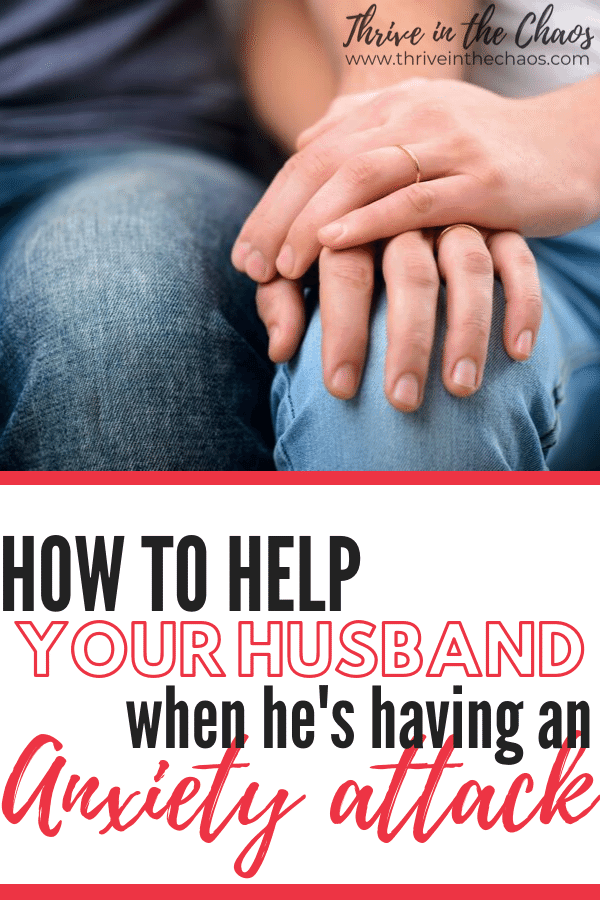
My husband is my best friend and I would do anything for him. Lately, he’s been struggling with anxiety. His anxiety waxes and waned, but is a normal part of our lives. I thought I’d share what I’ve learned about how to help him with his anxiety, in the hopes that it’ll offer some ideas of how to help your husband when he’s having an anxiety attack.
Pay Attention
The other night, while we were both working/playing on our computers, my husband quietly snuck away. Since he’s been struggling with anxiety lately, when he didn’t return, I went looking for him. I was already keeping an eye on him because he’d shown some potential warning signs of not feeling well- he’d requested dinner and then seemed hesitant to eat it. He seemed generally cautious and I could tell his guard was up.
Listen
I found him laying on our bed in the dark. I sat next to him and asked how he was doing. Your job as the support is to be a calming influence and to listen. Don’t overreact to anything your husband says, know that his mind isn’t in its right place right now.
I gently ask some probing questions to get my husband talking about what’s going on. It helps me know if what he’s experiencing is more mental or more physical.
Don’t pester your husband with a bunch of questions all at once. Ask what’s going on, and see if he can vocalize what he’s experiencing. Listen to his response.
Offer Help and Make Him Comfortable
Is there anything you can do to help with what he’s told you? I ask if there’s anything I can do or get to help. I’ll offer to get any applicable medicines: pain, anxiety, etc.
See if your husband is comfortable temperature-wise- offer a wet washcloth for his forehead and turn on a fan if he’s hot, or offer blankets if the room is chilly.
Don’t be upset if there isn’t anything you can do. Ultimately the best way you can be supportive is to listen and sit with them. Let your husband know you love him and you’re here for him. And then sit in silence with him, or listen as he talks.
Look For Patterns
Over time you’ll learn what is helpful and what isn’t. File it away mentally, or write it down for next time. For my husband, he likes me to be near, but not staring him down expectantly. So I’ll sit with him and play on my phone, read a book or pet one of our pets. For my husband, he gets comfort just from having someone nearby keeping an eye on him.
Does touch help or not? My first instinct is to offer physical comfort- stroke his arm, or head or rub his back, but my husband doesn’t want to be touched. So I’ve had to learn to restrain myself unless he requests it.
I find that my husband’s anxiety is often linked to exhaustion. I don’t know if he’s exhausted and that leads to anxiety, or his anxiety exhausts him. It’s probably a mix of both. But ultimately, the outcome is usually him falling asleep.
Keep Trying
There will be some trial and error as you both figure out what helps. I’m fortunate in that my husband has dealt with this for years before I came along, so he’s pretty well versed in what helps and what doesn’t and is pretty good at vocalizing his needs. That doesn’t mean it makes his anxiety any less intense or less frequent, but it means we’ve developed a routine that helps us work through it.
Keep an Open Dialogue
Don’t be afraid to discuss it afterward. What did you do that was helpful? What wasn’t helpful? Is there something you should try in the future or refrain from doing in the future. Have an open dialogue about it. This isn’t anything to be ashamed about. Let your husband know that he’s not any less for dealing with this and you love him just the same.
It may be the scientist in me, but I tend to discuss these things very frankly and matter-of-fact. I don’t fawn over or baby my husband. I don’t pity him or belittle him. I talk to him as my partner, because that’s what we are, partners. This is an aspect of his life that affects us both, so we approach it as a team, on equal footing.
Let your husband know that you are his equal partner in his struggle and just want to help him feel his best. Above all be kind, loving and understanding.